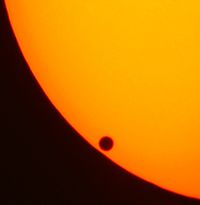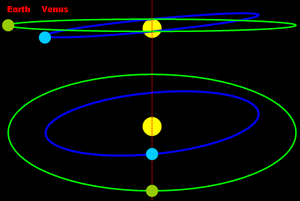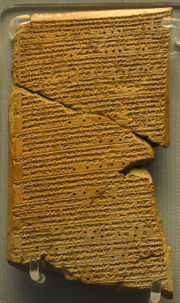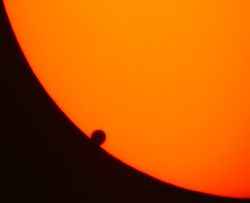Transit of Venus

A transit of Venus across the Sun takes place when the planet Venus passes directly between the Sun and Earth, obscuring a small portion of the solar disk. During a transit, Venus can be seen from Earth as a small black disk moving across the face of the Sun. The duration of such transits is usually measured in hours (the transit of 2004 lasted six hours). A transit is similar to a solar eclipse by the Moon, but, although the diameter of Venus is almost 4 times that of the Moon, Venus appears smaller because it is much farther away from Earth. Before the space age, observations of transits of Venus helped scientists use the principle of parallax to calculate the distance between the Sun and the Earth.
Transits of Venus are among the rarest of predictable astronomical phenomena and currently occur in a pattern that repeats every 243 years, with pairs of transits eight years apart separated by long gaps of 121.5 years and 105.5 years. The periodicity is a reflection of the fact that the orbital periods of Earth and Venus are close to 8:13 and 243:395 resonances. Before 2004, the last pair of transits were in December 1874 and December 1882. The first of a pair of transits of Venus in the beginning of the 21st century took place on 8 June 2004 (see Transit of Venus, 2004) and the next will be on 6 June 2012 (see Transit of Venus, 2012). After 2012, the next transits of Venus will be in December 2117 and December 2125.[1][2]
A transit of Venus can be safely observed by taking the same precautions used when observing the partial phases of a solar eclipse. Staring at the brilliant disk of the Sun (the photosphere) with the unprotected eye can quickly cause serious and often permanent eye damage.[3]
Contents |
Conjunctions

Venus, with an orbit inclined by 3.4° relative to the Earth's, usually appears to pass under (or over) the Sun in the sky at inferior conjunction.[4] A transit occurs when Venus reaches conjunction with the Sun at or near one of its nodes, the longitude where Venus passes through the Earth's orbital plane, called the ecliptic. Although the inclination between these two orbital planes is only 3.4°, Venus can be as far as 9.6° from the Sun when viewed from the Earth at inferior conjunction.[5] Since the angular diameter of the Sun is about half a degree, Venus may appear to pass above or below the Sun by more than 18 solar diameters during an ordinary conjunction.[4]
Sequences of transits occur in a pattern that repeats every 243 years, with transits occurring eight years apart followed by a gap of 121.5 years, then a gap of eight years and then another long gap of 105.5 years. The pattern repeats every 243 years because 243 sidereal orbital periods of the Earth (365.25636 days - slightly longer than the tropical year) is 88757.3 days, and 395 sidereal orbital periods of Venus (224.701 days) is 88756.9 days. Thus, after this period both Venus and Earth have returned to very nearly the same point in each of their respective orbits. This period of time corresponds to 152 synodic periods of Venus.[6]
The pattern of 105.5, 8, 121.5 and 8 years is not the only pattern that is possible within the 243-year cycle, because of the slight mismatch between the times when the Earth and Venus arrive at the point of conjunction. Prior to 1518, the pattern of transits was 8, 113.5 and 121.5 years, and the eight inter-transit gaps before the 546 CE transit were 121.5 years apart. The current pattern will continue until 2846, when it will be replaced by a pattern of 105.5, 129.5 and 8 years. Thus, the 243-year cycle is relatively stable, but the number of transits and their timing within the cycle will vary over time.[6][7]
Ancient and medieval history

Ancient Greek, Egyptian, Babylonian, and Chinese observers knew of Venus and recorded the planet’s motions. The early Greeks thought that the evening and morning appearances of Venus represented two different objects, Hesperus - the evening star and Phosphorus - the morning star.[8] Pythagoras is credited with realizing they were the same planet. There is no evidence that any of these cultures knew of the transits. Venus was important to ancient American civilizations, in particular for the Maya, who called it Noh Ek, "the Great Star" or Xux Ek, "the Wasp Star";[9] they embodied Venus in the form of the god Kukulkán (also known as or related to Gukumatz and Quetzalcoatl in other parts of Mexico). In the Dresden Codex, the Maya charted Venus' full cycle, but despite their precise knowledge of its course, there is no mention of the transit.[10]
The transit of Venus was claimed to have been observed by medieval Islamic astronomers. The Persian polymath Avicenna claimed to have observed the 24 May 1032 Venus transit of the Sun[11]. He used this observation to demonstrate that Venus was, at least sometimes, below the Sun in the Ptolemaic cosmology.[12] Soon after, he wrote the Compendium of the Almagest, a commentary on Ptolemy's Almagest, in which he concluded that Venus is closer to the Earth than the Sun.[11] In the 12th century, the Andalusian astronomer Ibn Bajjah reported seeing "the two planets as black spots on the face of the Sun." In the 13th century, the Maragha astronomer Qotb al-Din Shirazi identified Ibn Bajjah's observation as transits of Venus and Mercury.[13] However, Ibn Bajjah cannot have observed a transit of Venus, as none occurred in his lifetime.[14]
Modern observations

Aside from its rarity, the original scientific interest in observing a transit of Venus was that it could be used to determine the size of the solar system by employing the parallax method and Kepler's third law. The technique involved making precise observations of the slight difference in the time of either the start or the end of the transit from widely separated points on the Earth's surface. The distance between the points on the Earth was then used as a baseline to calculate the distance to Venus and the Sun via triangulation.[15]
Although by the 17th century astronomers could calculate each planet's relative distance from the Sun in terms of the distance of the Earth from the Sun (an astronomical unit), an accurate absolute value of this distance had not been determined.
In 1627, Johannes Kepler became the first person to predict a transit of Venus, by predicting the 1631 event. His methods were not sufficiently accurate to predict that the transit would not be visible in most of Europe, and as a consequence, nobody was able to make arrangements to observe the transit.[16]


First European scientific observation
The first European scientific observation of a transit of Venus was made by Jeremiah Horrocks from his home at Carr House in Much Hoole, near Preston in England, on 4 December 1639 (24 November under the Julian calendar then in use in England). His friend, William Crabtree, also observed this transit from Salford, near Manchester. Kepler had predicted transits in 1631 and 1761 and a near miss in 1639. Horrocks corrected Kepler's calculation for the orbit of Venus and realized that transits of Venus would occur in pairs 8 years apart, and so predicted the transit in 1639. Although he was uncertain of the exact time, he calculated that the transit was to begin at approximately 3:00 pm. Horrocks focused the image of the Sun through a simple telescope onto a piece of card, where the image could be safely observed. After observing for most of the day, he was lucky to see the transit as clouds obscuring the Sun cleared at about 3:15 pm, just half an hour before sunset. Horrocks' observations allowed him to make a well-informed guess as to the size of Venus, as well as to make an estimate of the distance between the Earth and the Sun. He estimated the distance of the Sun from the Earth at 59.4 million miles (95.6 Gm, 0.639 AU) – about two thirds the correct size of 93 million miles (149.6 million km), but a more accurate figure than any suggested up to that time. However, Horrocks' observations were not published until 1661, well after his death.[17]
1761 and 1769
The transit pair of 1761 and 1769 were used to try to determine the precise value of the astronomical unit (AU) using parallax. This method of determining the AU was first described by James Gregory in Optica Promota in 1663. Following the proposition put forward by Edmond Halley (who had died almost twenty years earlier),[15] numerous expeditions were made to various parts of the world in order to observe these transits; an early example of international scientific collaboration. In an attempt to observe the first transit of the pair, scientists and explorers from Britain, Austria and France travelled to destinations around the world, including Siberia, Norway, Newfoundland and Madagascar.[18] Most managed to observe at least part of the transit, but excellent readings were made in particular by Jeremiah Dixon and Charles Mason at the Cape of Good Hope.[19]
On the basis of his observation of the transit of Venus of 1761 from the Petersburg Observatory, Mikhail Lomonosov predicted the existence of an atmosphere on Venus. Lomonosov detected the refraction of solar rays while observing the transit and inferred that only refraction through an atmosphere could explain the appearance of a light ring around the part of Venus that had not yet come into contact with the Sun's disk during the initial phase of transit.[20]
For the 1769 transit, scientists traveled to Hudson Bay, Baja California (then under Spanish control) and Norway. Observations also were made from Tahiti on the first voyage of Captain Cook,[21] at a location still known as "Point Venus".[22] The Czech astronomer Christian Mayer was invited by Catherine the Great to observe the transit in Saint Petersburg, but his observations were mostly obscured by clouds.[23]

The unfortunate Guillaume Le Gentil spent eight years travelling in an attempt to observe either of the transits; his unsuccessful journey led to him losing his wife and possessions and being declared dead (his efforts became the basis of the play Transit of Venus by Maureen Hunter).[18]
Unfortunately, it was impossible to time the exact moment of the start and end of the transit because of the phenomenon known as the "black drop effect". The black drop effect was long thought to be due to Venus' thick atmosphere, and initially it was held to be the first real evidence that Venus had an atmosphere; however recent studies demonstrate that it is an optical effect caused by the smearing of the image of Venus by turbulence in the Earth's atmosphere or imperfections in the viewing apparatus.[24][25]
In 1771, using the combined 1761 and 1769 transit data, the French astronomer Jérôme Lalande calculated the astronomical unit to have a value of 153 million kilometers(±1 million km). The precision was less than hoped-for because of the black drop effect, but still a considerable improvement on Horrocks' calculations.[18]
1874 and 1882
Transit observations in 1874 and 1882 allowed this value to be refined further. Several expeditions were sent to the Kerguelen Archipelago for the 1874 observations. The American astronomer Simon Newcomb combined the data from the last four transits and derived a value of 149.59 million kilometers (±0.31 million km). Modern techniques, such as space probe telemetry and radar observations of solar system objects, have allowed a precise value for the astronomical unit to be calculated (to an accuracy of ±30 m), and so negated the need for parallax calculations.[18][25]
2004
There was however a good deal of interest in the 2004 transit as scientists attempted to measure the pattern of light dimming as Venus blocked out some of the Sun's light, in order to refine techniques that they hope to use in searching for extrasolar planets.[25][26] Current methods of looking for planets orbiting other stars only work for a few cases: planets that are very large (Jupiter-like, not Earth-like), whose gravity is strong enough to wobble the star sufficiently for us to detect changes in proper motion or Doppler shift changes in radial velocity, Jupiter or Neptune sized planets very close to their parent star, or through gravitational microlensing by planets which pass in front of background stars with the planet-parent star separation comparable to the Einstein ring.[27] Measuring light intensity during the course of a transit, as the planet blocks out some of the light, is potentially much more sensitive, and might be used to find smaller planets.[25] However, extremely precise measurement is needed: for example, the transit of Venus causes the Sun's light to drop by a mere 0.001 magnitude, and the dimming produced by small extrasolar planets will be similarly tiny.[28]
Past and future transits
Transits can currently occur only in June or December (see table). These dates are slowly becoming later in the year; before 1631, transits occurred in May and November.[6] Transits usually occur in pairs, on nearly the same date eight years apart. This is because the length of eight Earth years is almost the same as 13 years on Venus, so every eight years the planets are in roughly the same relative positions. This approximate conjunction usually results in a pair of transits, but it is not precise enough to produce a triplet, since Venus arrives 22 hours earlier each time.[6] The last transit not to be part of a pair was in 1396. The next will be in 3089; in 2854 (the second of the 2846/2854 pair), although Venus will just miss the Sun as seen from the Earth's equator, a partial transit will be visible from some parts of the southern hemisphere.[29]
| Transits of Venus | |||||
|---|---|---|---|---|---|
| Date(s) of transit |
Time (UTC) | Notes | Transit Path (HM Nautical Almanac Office) |
||
| Start | Mid | End | |||
| 1032 May 24 | Observed by the Persian astronomer and polymath Avicenna.[11][12] | ||||
| 1396 November 23 | 15:45 | 19:27 | 23:09 | Last transit not part of a pair. Some believe Aztec astronomers may have seen this transit. | [1] |
| 1518 May 25–26 | 22:46 May 25 |
01:56 May 26 |
05:07 May 26 |
[2] | |
| 1526 May 23 | 16:12 | 19:35 | 21:48 | Last transit before invention of telescope | [3] |
| 1631 December 7 | 03:51 | 05:19 | 06:47 | Predicted by Kepler | [4] |
| 1639 December 4 | 14:57 | 18:25 | 21:54 | First transit observed by Horrocks and Crabtree | [5] |
| 1761 June 6 | 02:02 | 05:19 | 08:37 | Lomonosov observes the atmosphere of Venus | [6] |
| 1769 June 3–4 | 19:15 June 3 |
22:25 June 3 |
01:35 June 4 |
Captain Cook's voyage to Tahiti | [7] |
| 1874 December 9 | 01:49 | 04:07 | 06:26 | Pietro Tacchini leads expedition to Muddapur, India. A French expedition goes to New Zealand's Campbell Island | [8] |
| 1882 December 6 | 13:57 | 17:06 | 20:15 | John Phillip Sousa composes a march, "The Transit of Venus", in honor of the transit.[25] | [9] |
| 2004 June 8 | 05:13 | 08:20 | 11:26 | Various media networks globally broadcast live video of the Venus transition. | [10] |
| Transits of Venus | |||||
|---|---|---|---|---|---|
| Date(s) of transit |
Time (UTC) | Notes | Transit Path (HM Nautical Almanac Office) |
||
| Start | Mid | End | |||
| 2012 June 5–6 | 22:09 June 5 |
01:29 June 6 |
04:49 June 6 |
Visible in its entirety from Hawaii, Alaska, Australia, the Pacific and eastern Asia, with the beginning of the transit visible from North America. | [11] |
| 2117 December 10–11 | 23:58 December 10 |
02:48 December 11 |
05:38 December 11 |
Visible in entirety in eastern China, Japan, Taiwan, Indonesia, and Australia. Partly visible on extreme U.S. West Coast, and in India, most of Africa, and the Middle East. | [12] |
| 2125 December 8 | 13:15 | 16:01 | 18:48 | Visible in entirety in South America and the eastern U.S. Partly visible in Western U.S., Europe, and Africa. | [13] |
| 2247 June 11 | 08:42 | 11:33 | 14:25 | Visible in entirety in Africa, Europe, and the Middle East. Partly visible in East Asia and Indonesia, and in North and South America. | [14] |
| 2255 June 9 | 01:08 | 04:38 | 08:08 | Visible in entirety in Russia, India, China, and western Australia. Partly visible in Africa, Europe, and the western U.S. | [15] |
| 2360 December 12–13 | 22:32 December 12 |
01:44 December 13 |
04:56 December 13 |
Visible in entirety in Australia and most of Indonesia. Partly visible in Asia, Africa, and the western half of the Americas. | [16] |
| 2368 December 10 | 12:29 | 14:45 | 17:01 | Visible in entirety in South America, western Africa, and the U.S. East Coast. Partly visible in Europe, the western U.S., and the Middle East. | [17] |
| 2490 June 12 | 11:39 | 14:17 | 16:55 | Visible in entirety through most of the Americas, western Africa, and Europe. Partly visible in eastern Africa, the Middle East, and Asia. | [18] |
| 2498 June 10 | 03:48 | 07:25 | 11:02 | Visible in entirety through most of Europe, Asia, the Middle East, and eastern Africa. Partly visible in eastern Americas, Indonesia, and Australia. | [19] |
Over longer periods of time, new series of transits will start and old series will end. Unlike the saros series for lunar eclipses, it is possible for a transit series to restart after a hiatus. The transit series also vary much more in length than the saros series.
Grazing and simultaneous transits
Sometimes Venus only grazes the Sun during a transit. In this case it is possible that in some areas of the Earth a full transit can be seen while in other regions there is only a partial transit (no second or third contact). The last transit of this type was on 6 December 1631, and the next such transit will occur on 13 December 2611.[6] It is also possible that a transit of Venus can be seen in some parts of the world as a partial transit, while in others Venus misses the Sun. Such a transit last occurred on 19 November 541 BC, and the next transit of this type will occur on 14 December 2854.[6]
The simultaneous occurrence of a transit of Mercury and a transit of Venus is possible, but only in the distant future. Such an event last occurred on 22 September 373,173 BC and will next occur on 26 July 69,163, and again on 29 March 224,508.[30][31] The simultaneous occurrence of a solar eclipse and a transit of Venus is currently possible, but very rare. The next solar eclipse occurring during a transit of Venus will be on 5 April 15,232.[30] The last time a solar eclipse occurred during a transit of Venus was on 1 November 15,607 BC.[32] It could be noticed that the day after the Venusian transit of 3 June 1769 there was a total solar eclipse,[33] which was visible in Northern America, Europe and Northern Asia.
Observing
The safest way to observe a transit is to project the image of the Sun through a telescope, binoculars, or pinhole onto a screen, but the event can be viewed with the naked eye using filters specifically designed for this purpose, such as an astronomical solar filter with a vacuum-deposited layer of chromium, eclipse viewing glasses, or Grade 14 welder's glass. An earlier method of using exposed black-and-white film as a filter is no longer regarded as safe, as small imperfections or gaps in the film may permit damaging UV rays to pass through. Also, processed color film (unlike black-and-white film) does not contain silver, and is transparent to infra-red. This may result in burns to the retina. Observing the Sun directly without filters can cause a temporary or permanent loss of visual function, as it can damage or destroy retinal cells.[3][34]
There are four named "contacts" during a transit - moments when the circumference of Venus touches the circumference of the Sun at a single point:
- First contact (external ingress): Venus is entirely outside the disk of the Sun, moving inward
- Second contact (internal ingress): Venus is entirely inside the disk of the Sun, moving further inward
- Third contact (internal egress): Venus is entirely inside the disk of the Sun, moving outward
- Fourth contact (external egress): Venus is entirely outside the disk of the Sun, moving outward.[3]
A fifth named point is that of greatest transit, when Venus is at the middle of its path across the solar disk and which marks the halfway point in the timing of the transit.[3]
See also
- "Transit of Venus March", by John Philip Sousa.
- Mason and Dixon by Thomas Pynchon.
Notes
- ↑ John E. Westfall (2003-11). "June 8, 2004: The Transit of Venus". Archived from the original on August 8, 2007. http://web.archive.org/web/20070808030058/http://www.lpl.arizona.edu/~rhill/alpo/transitstuff/transit2004.html. Retrieved 25 September 2006.
- ↑ Westfall, John E.. "June 8, 2004: The Transit of Venus". alpo-astronomy.org. http://www.alpo-astronomy.org/transit/transit2004.html. Retrieved December 8, 2009.
- ↑ 3.0 3.1 3.2 3.3 "Transit of Venus - Safety". University of Central Lancashire. http://www.transit-of-venus.org.uk/safety.htm. Retrieved 21 September 2006.
- ↑ 4.0 4.1 "Venus compared to Earth". European Space Agency. 2000. http://www.esa.int/SPECIALS/Venus_Express/SEM9C3808BE_0.html. Retrieved 25 September 2006.
- ↑ Juergen Giesen (2003). "Transit Motion Applet". http://www.venus-transit.de/TransitMotion/index.htm. Retrieved 26 September 2006.
- ↑ 6.0 6.1 6.2 6.3 6.4 6.5 Fred Espenak (2004-02-11). "Transits of Venus, Six Millennium Catalog: 2000 BCE to 4000 CE". NASA. http://sunearth.gsfc.nasa.gov/eclipse/transit/catalog/VenusCatalog.html. Retrieved 21 September 2006.
- ↑ John Walker. "Transits of Venus from Earth". Fourmilab Switzerland. http://www.fourmilab.ch/documents/canon_transits/tr_Venus_from_Earth.html.gz. Retrieved 21 September 2006.
- ↑ Paul Rincon (2005-11-07). "Planet Venus: Earth's 'evil twin'". BBC. http://news.bbc.co.uk/1/hi/sci/tech/4335628.stm. Retrieved 25 September 2006.
- ↑ Morley, Sylvanus G. (1994). The Ancient Maya (5th ed.). Stanford Univ Press. ISBN 9780804723107.
- ↑ Bohumil Böhm and Vladimir Böhm. "The Dresden Codex — the Book of Mayan Astronomy". http://www.volny.cz/paib/dresden_codex.htm. Retrieved 25 September 2006.
- ↑ 11.0 11.1 11.2 Goldstein, Bernard R. (March 1972). "Theory and Observation in Medieval Astronomy". Isis (University of Chicago Press) 63 (1): 39–47 [44]. doi:10.1086/350839.
- ↑ 12.0 12.1 Ragep, Sally P. (2007). "Ibn Sīnā". In Thomas Hockey et al. (eds.). The Biographical Encyclopedia of Astronomers. New York: Springer New York. pp. 570–572. ISBN 978-0-387-31022-0.
- ↑ S. M. Razaullah Ansari (2002). History of oriental astronomy: proceedings of the joint discussion-17 at the 23rd General Assembly of the International Astronomical Union, organised by the Commission 41 (History of Astronomy), held in Kyoto, August 25–26, 1997. Springer. p. 137. ISBN 1402006578.
- ↑ Fred Espenak. Six Millennium Catalog of Venus Transits
- ↑ 15.0 15.1 Dr. Edmund Halley. A New Method of Determining the Parallax of the Sun, or His Distance from the Earth, Sec. R. S., N0 348. pp. 454. http://sunearth.gsfc.nasa.gov/eclipse/transit/HalleyParallax.html.
- ↑ Robert H. van Gent. "Transit of Venus Bibliography". http://www.phys.uu.nl/~vgent/venus/venustransitbib.htm. Retrieved 11 September 2009.
- ↑ Paul Marston (2004). Jeremiah Horrocks - young genius and first Venus transit observer. University of Central Lancashire. pp. 14–37.
- ↑ 18.0 18.1 18.2 18.3 Prof. Richard Pogge. "Lecture 26:How far to the sun? The Venus Transits of 1761 & 1769". http://www.astronomy.ohio-state.edu/~pogge/Ast161/Unit4/venussun.html. Retrieved 25 September 2006.
- ↑ "National Dictionary of Biography - Biography of Jeremiah Dixon". Oxford University Press. http://www.hyperarts.com/pynchon/mason-dixon/extra/dixon_bio.html. Retrieved 25 September 2006.
- ↑ Mikhail Ya. Marov (2004). "Mikhail Lomonosov and the discovery of the atmosphere of Venus during the 1761 transit". Proceedings of the International Astronomical Union (Cambridge University Press): 209–219.
- ↑ Ernest Rhys, ed (1999). The Voyages of Captain Cook. Wordsworth Editions Ltd. pp. 29–30. ISBN 1-84022-100-3.
- ↑ See, for example, Stanley, David (2004). Moon Handbooks South Pacific (8 ed.). Avalon Travel Publishing. p. 175. ISBN 978-1566914116. http://books.google.com/?id=EDGapfBX-CAC&pg=PA175&dq=point+venus+cook.
- ↑ Christian Mayer. "An Account of the Transit of Venus: In a Letter to Charles Morton, M. D. Secret. R. S. from Christian Mayer, S. J. Translated from the Latin by James Parsons, M. D". Royal society (GB). Philosophical transactions 54: 163. http://visualiseur.bnf.fr/Visualiseur?O=NUMM-55859&I=203&M=tdm.
- ↑ "Explanation of the Black-Drop Effect at Transits of Mercury and the Forthcoming Transit of Venus". AAS. 2004-01-04. http://www.aas.org/publications/baas/v35n5/aas203/26.htm. Retrieved 21 September 2006.
- ↑ 25.0 25.1 25.2 25.3 25.4 "Transits of Venus - Kiss of the goddess". The Economist. 2004-05-27. http://www.economist.com/science/displayStory.cfm?story_id=2705523. Retrieved 25 September 2006.
- ↑ Maggie McKee (2004-06-06). "Extrasolar planet hunters eye Venus transit". New Scientist. http://www.newscientist.com/article.ns?id=dn5074. Retrieved 27 September 2006.
- ↑ A. Gould et al. (2006-06-10). "Microlens OGLE-2005-BLG-169 Implies That Cool Neptune-like Planets Are Common". The Astrophysical Journal Letters (The American Astronomical Society) 644 (1): L37–L40. doi:10.1086/505421. http://www.journals.uchicago.edu/doi/full/10.1086/505421.
- ↑ Fred Espenak (2002-06-18). "2004 and 2012 Transits of Venus". NASA. http://sunearth.gsfc.nasa.gov/eclipse/transit/venus0412.html. Retrieved 25 September 2006.
- ↑ Steve Bell (2004). "Transits of Venus 1000 AD – 2700 AD". HM Nautical Almanac Office. Archived from the original on September 7, 2006. http://web.archive.org/web/20060907011312/http://www.nao.rl.ac.uk/nao/transit/. Retrieved 25 September 2006.
- ↑ 30.0 30.1 "Hobby Q&A", Sky&Telescope, August 2004, p. 138.
- ↑ Fred Espenak (2005-04-21). "Transits of Mercury, Seven Century Catalog: 1601 CE to 2300 CE". NASA. http://sunearth.gsfc.nasa.gov/eclipse/transit/catalog/MercuryCatalog.html. Retrieved 27 September 2006.
- ↑ Jeliazkov, Jeliazko. "Simultaneous occurrence of solar eclipse and a transit". transit.savage-garden.org. http://transit.savage-garden.org/ecltra.html. Retrieved 2009-08-11.
- ↑ de La Lande, M.; Messier, M. (1769). "Observations of the Transit of Venus on 3 June 1769, and the Eclipse of the Sun on the Following Day, Made at Paris, and Other Places. Extracted from Letters Addressed from M. De la Lande, of the Royal Academy of Sciences at Paris, and F. R. S. to the Astronomer Royal; And from a Letter Addressed from M. Messier to Mr. Magalhaens". Philosophical Transactions (1683–1775) 59: 374–377. http://adsabs.harvard.edu/cgi-bin/nph-bib_query?bibcode=1769RSPT...59..374D.
- ↑ Fred Espenak. "Eye Safety During Solar Eclipses (Adapted from NASA RP 1383 Total Solar Eclipse of 1998 February 26, April 1996, p. 17.)". http://sunearth.gsfc.nasa.gov/eclipse/SEhelp/safety.html. Retrieved 21 September 2006.
Further reading
- Maor, Eli (2000). Venus in Transit. Princeton: Princeton University Press. ISBN 0-691-11589-3.
- Sheehan, William; Westfall, John (2004). The Transits of Venus. Amherst, New York: Prometheus Books. ISBN 1-59102-175-8.
External links
- Transits of Venus - Fifteen millennium catalog: 5 000 BC - 10 000 AD
- Predictions for the 2012 transit of Venus
- Reanimating the 1882 Transit of Venus, in Sky and Telescope magazine online
- Transit of Venus
- Historical observations of the transit of Venus
- The transit of Venus across the Sun (PDF)
- The transit of Venus: a stroke of luck for teachers (PDF)
|
||||||||||||||||||||
|
|||||||||||||||||||||||||||||||
